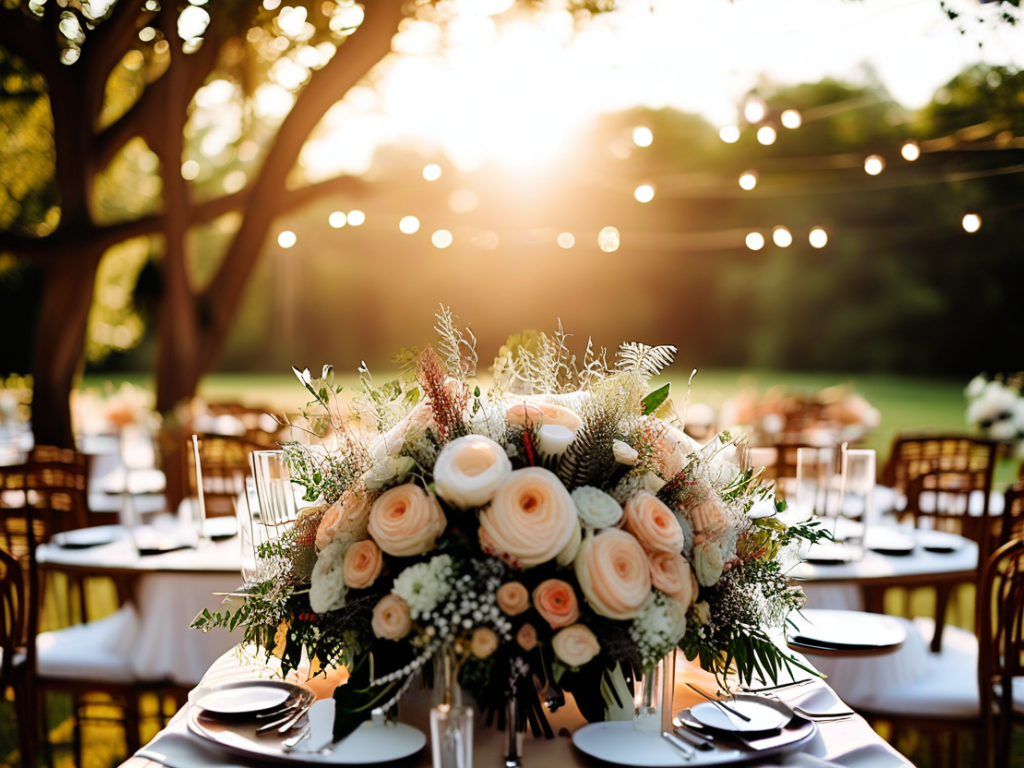Planning an outdoor wedding is a dream for many couples, offering a picturesque backdrop and a unique atmosphere that can’t be replicated indoors. However, with the great outdoors comes additional considerations to ensure your special day goes off without a hitch. Here are some key elements to consider when planning an outdoor wedding:
In this article you will find:
- 1. Choosing the Perfect Venue
- 2. Weather Contingency Plans
- 3. Guest Comfort
- 4. Sound and Lighting
- 5. Decor and Theme
- 6. Permits and Regulations
- 7. Catering Considerations
- 8. Guest Transportation
- 9. Embracing Nature
1. Choosing the Perfect Venue
When selecting an outdoor venue for your wedding, consider the scenery, overall vibe, and logistics. Whether you opt for a beach, garden, vineyard, or a rustic barn, make sure it aligns with your vision and has the necessary facilities like restrooms, electricity, and backup plans for unexpected weather changes.
2. Weather Contingency Plans
One of the biggest challenges of outdoor weddings is dealing with the unpredictability of weather. Be prepared with backup plans such as renting a tent, umbrellas for guests, or selecting a venue with indoor options in case of rain or extreme heat.
3. Guest Comfort
Ensuring your guests are comfortable is crucial for a successful outdoor wedding. Provide shade, fans, or heaters as needed, especially during extreme weather conditions. If the ground is uneven, consider providing heel protectors for your guests’ shoes.
4. Sound and Lighting
Outdoor spaces can present challenges for sound quality and lighting. Hire professionals to set up adequate sound systems, microphones, and lighting to ensure your guests can hear the ceremony and speeches, and the evening festivities are well-lit and magical.

5. Decor and Theme
Embrace the natural beauty of your outdoor venue by incorporating your decor and theme seamlessly into the surroundings. Consider using local flowers, greenery, and natural elements to enhance the ambiance and create a cohesive look that complements the outdoor setting.
6. Permits and Regulations
Don’t forget to obtain any necessary permits and check local regulations before setting up your outdoor wedding. Some venues may have restrictions on music, fireworks, or the use of open flames, so make sure you comply with all rules to avoid any last-minute surprises.
7. Catering Considerations
Outdoor weddings may require special catering considerations such as food safety, temperature control, and access to water and electricity. Work closely with your caterer to create a menu that suits the outdoor setting and ensure all necessary accommodations are in place.
8. Guest Transportation
If your outdoor venue is remote or lacks parking facilities, consider arranging transportation for your guests to and from the location. Shuttle buses, carpooling options, or providing detailed directions can help ensure everyone arrives safely and on time.
9. Embracing Nature
Finally, embrace the beauty of nature and make it a central part of your outdoor wedding experience. Use the natural surroundings as a backdrop for photos, incorporate eco-friendly elements into your decor, and create a serene and magical atmosphere that reflects the love and joy of your special day.
By considering these key elements when planning your outdoor wedding, you can create a magical and memorable celebration that truly reflects your love story and vision for the future.


